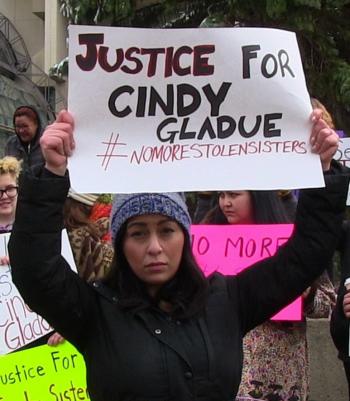Image Caption
Trigger Warning: Contains Graphic Content
By Paula E. Kirman
Windspeaker.com Contributor
EDMONTON
When Bradley Barton was found not guilty in March 2015 of murder or manslaughter in the death of Cindy Gladue, there was much public outcry and protest. On June 30 of this year, the Court of Appeal of Alberta announced that Barton, a truck driver from Ontario, will be retried for first-degree murder.
Gladue was a 36-year-old Indigenous woman who was found dead in 2011. Her body was found in a bathtub of an Edmonton motel room after she bled to death.
Barton claimed that the two had consensual, rough sex. Certain aspects of the trial were criticized by advocacy groups, such as the Women's Legal Education and Action Fund and the Institute for the Advancement of Aboriginal Women, both of which were granted intervener status at trial.
Gladue was repeatedly referred to as a “prostitute” and “Native girl” in front of the jury, and her vagina (of which the medical examiner testified that an 11-centimetre cut was caused by a sharp object) had been preserved and presented as an exhibit, much to the horror and offense to family and friends.
The Court of Appeal of Alberta ruled that there were “significant” errors made during the initial trial. The court also cited errors in the way that the jury was instructed in regard to the explanations of the law about sexual assault, sexual activity, and consent.
“It's a significant decision for Cindy's family, first and foremost, for the justice system, and for all of us who care about human rights and the consent laws,” says Kate Quinn, executive director of the Centre to End All Sexual Exploitation (CEASE).
“I hope that in the new trial there will be no references to Cindy as a 'prostitute.' That terms was struck from the Criminal Code in 2014. It dehumanizes and stigmatizes women.”
April Wiberg, with the Stolen Sisters Awareness Movement, also believes that the publication ban against revealing Barton's visual identity should be lifted.
“I believe the publicity ban that is protecting Bradley Barton's identity should be lifted. To this day, the general public (does) not know what (he) looks like. We don't know if there have been other victims, women that have also been assaulted, but survived. How do we know there are not more victims? Perhaps if there were, and his identity was known, others would identify him and come forward and testify against him in court.”
In an interview with the Edmonton Journal on June 30, Barton's defence lawyer Dino Bottos was quoted as saying that the appeal court is “trying to correct every perceived inequality in sexual assault law in Canada with this judgment.”
The article went onto say that Barton has until late September to determine whether or not to seek leave to appeal to the Supreme Court of Canada.

